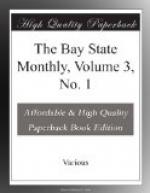Like the favorite character, Joshua Whitcomb, in his favorite play, Mr. Thompson is personally sensitive, kind-hearted, self-sacrificing; he never speaks ill of any one, delights in doing good, and enjoys hearing and telling a good story; he is quiet, yet full of fun; generous to a fault. His company has become much attached to him.
In the village of Swansey is Mr. Thompson’s summer home; a beautiful mansion, surrounded by grounds where art and nature combine to please. The hospitality of the house is proverbial, but its chief attraction is its well-stocked library.
* * * * *
NATIONAL BANKS.
THE SURPLUS FUND AND NET PROFITS.
By George H. Wood.
In the elimination of an unusually large amount of dead assets under the requirements of the National Bank law, previous to extension of the corporate existence of a bank, the very interesting question is brought to notice, of what is the proper construction of the law in regard to reducing and restoring the surplus fund.
Does the law forbid the payment of a dividend by a National Bank when the effect of such payment will be to reduce the surplus fund of the bank below an amount equal to one-tenth of its net profits since its organization as a National Bank; and if so, upon what ground? It does, and for the following reasons. The power to declare dividends is granted by section 5199 of the Revised Statutes of the United States in the following language: “The Directors of any association (National Bank) may semi-annually declare a dividend of so much of the net profits of the association as they shall judge expedient; but each association shall, before the declaration of a dividend, carry one-tenth of its net profits of the preceding half year to its surplus fund until the same shall amount to twenty per cent, of its capital stock.”
The question at once arises, what are the net profits from which dividends may be declared, and do they include the surplus fund? It is held that the net profits are the earnings left on hand after charging off expenses, taxes and losses, if any, and carrying to surplus fund the amount required by the law, and that the surplus fund is not to be considered as net profits available for dividends, for, if it were, the Directors of a bank could at any time divide the surplus among the shareholders. It would only be necessary to go through the form of carrying one-tenth of the net profits to surplus, whereupon, if the surplus be net profits available for the purpose of a dividend, the amount so carried can be withdrawn and paid away at once, thereby defeating the obvious purpose of the law in requiring a portion of each six month’s earnings to be carried to the surplus fund, that purpose being to provide that a surplus fund equal to twenty per cent, of the bank’s capital shall be accumulated.




